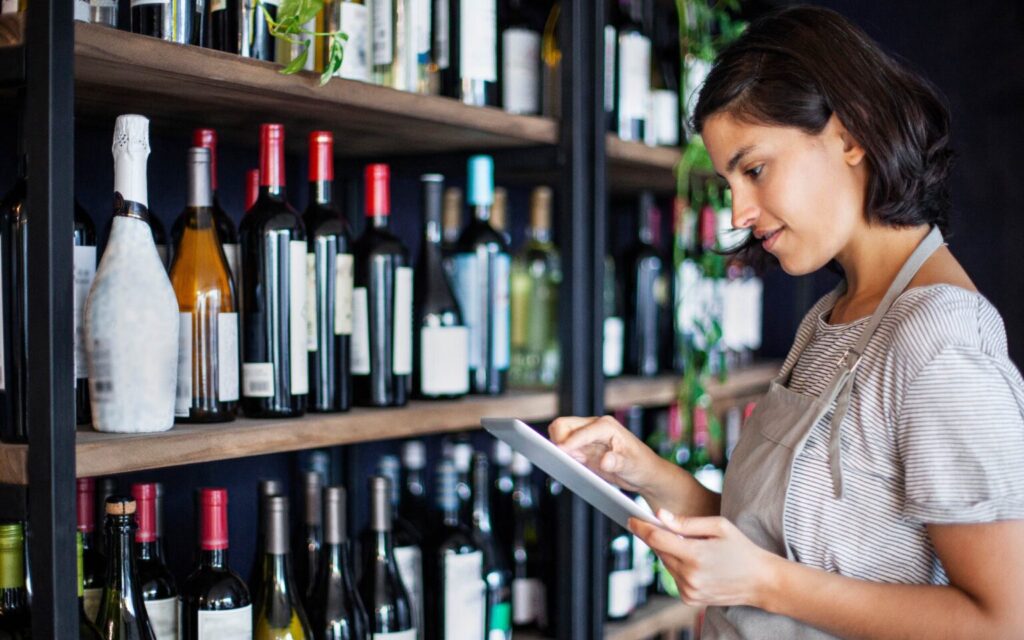Thinking about opening a liquor store, but don’t know where to start? Whether It’s a New Year’s Eve or a birthday celebration, people can’t resist buying a bottle of their favorite wine. Therefore, a steady revenue stream can be expected in all seasons.
Managing any business requires end-to-end management. You need to do a lot of tedious work, and liquor businesses are no exception.
Starting a liquor store business is no easy challenge. From inventory management to customer satisfaction, keeping track of everything can be overwhelming. While it may seem daunting, with the right strategy you can build a liquor business that generates a steady income.
However, it can be difficult for you to know where to start. But don’t worry, Modisoft’s startup guide will help you learn how you can start a profitable liquor store business in the United States.
Pros of Starting a Liquor Store
Owning a liquor store might seem like an exciting opportunity to generate revenue, but it also comes with way more challenges than any regular business. You need to abide by state and federal law and be legally compliant.
The good news is that several benefits come along the way when you step into the liquor industry. Let’s know the pros of starting and operating a liquor store.
1. Recession & Inflation Resistant
Do you know what the biggest fear of starting a business is? It’s the rising inflation and recessions that can severely impact your business revenue. After all who wants to lose the profits? Fortunately, the liquor store business is amongst those businesses that are recession-resistant.
Regardless of the economic climate, the alcohol industry not only survives but thrives. Even during WW2, the U.S. government declared beer brewing an essential wartime industry. When times are tough, people might change where and what they drink, but history shows that they won’t stop drinking.
2. Stable Inventory
The shelf-life of a product is a major factor that can influence your business revenue. Liquor store businesses enjoy extended shelf-life resulting in stable inventory. Many liquor types don’t have expiration dates, and in fact, some drinks that are stored for a long period offer an enhanced taste to the customers.
However, stable inventory doesn’t mean that you should be overstocked. Excess liquor inventories can take up valuable shelf space and tie up capital. To avoid this issue, you can switch to Modisoft’s most advanced liquor store inventory management system which uses historical sales and inventory data to help you make informed decisions that positively affect your bottom line.
3. Less Competitive
Did you know that the liquor industry is less competitive than other industries? The strict state and federal regulations let American State control the importation, distribution, promotion, and sale of alcohol. While getting a license for your liquor won’t be easy, once you have it, you’ll enjoy the freedom to do business in a less competitive environment. It is less likely that you’ll be surrounded by other liquor store businesses in that geographical location.
Cons of Starting a Liquor Store
No business is a cash cow unless you spend money, time, and resources to make it sustainable. Similarly, when it comes to liquor stores, you can’t expect to be profitable from day one unless you strategically plan every little thing.
Therefore, before owning a liquor store you need to consider the disadvantages. Here are the top cons that you need to evaluate when planning to open a liquor store business.
1. High Inventory Cost
The first challenge that you need to face is the high inventory cost. When you are starting a liquor store from scratch, you’ll need to have strong financial backing. The initial setup and real-estate costs can be quite high depending on the location you choose. To avoid high inventory costs, you need to fund your business appropriately and manage your resources wisely.
2. Restricted Liquor Distribution
Do you know what the biggest downside of the liquor store business is? It’s navigating the product tier system which is regulated on a state-to-state basis. The Alcohol Beverage Control Board of every state establishes rules for liquor retail sales within their territory. They also enforce strong penalties on any business that bend or break these laws.
Is Owning a Liquor Store Profitable?
Owning a liquor store can be exciting but at the same time can be challenging for newcomers. You have to establish your presence, get a license, hire employees, and much more. So, is it worth spending thousands of dollars? Can you make a sustainable profit from your liquor store or is it a lucrative industry or not? You might be thinking about these questions while conducting your research.
No business is a fail-proof business. Around 20% of businesses fail in their first year. But that doesn’t mean you can’t make a profit by owning a liquor store. The liquor industry can be incredibly lucrative if the right management and strategies are implemented.
In general, liquor store businesses are more profitable compared to grocery and convenience stores. On average, a single convenience store can make up to 5% profit, while liquor stores have the potential to make up to 15-20% of the profit.
Pro Tip: If you’re considering signing up for alcohol delivery, you can switch to the Modisoft Cartzie App which makes it convenient for your customers to order their favorite brands from the comfort of their home.
How Much Does It Cost to Open a Liquor Store?
Budgeting and forecasting appropriately is necessary to open a successful liquor store. Knowing how much it will cost to open a liquor store is vital to calculate. Liquor store startup costs can vary depending on the location, inventory, license, and much more.
This type of business works differently. You need to first find the retail location before you can get a liquor license. The property cost can vary depending on whether you are signing a lease or buying it. However, you can expect to invest a minimum of $50,000 to $100,000 when opening a liquor store.
The major cost you will need to cover as a part of a liquor store ownership includes:
- Insurance: You need to spend thousands of dollars to make sure, from liability to compensation, everything is covered.
- Inventory: The liquor store inventory cost can be up to $35,000 to stock shelves with a great selection of liquor.
- Renovation: Any retail space you find will require certain renovation. From painting to shelving, it can take up to $20,000 in renovations.
- POS System: The point-of-sale system costs can vary depending on the company you prefer. Modisoft hardware gives you a variety of options to select any of the reliable systems that best fit your business needs.
Open a Successful Liquor Store in 8 Steps
After reading the pros and cons and other factors, you know that the liquor industry is a vibrant, fast-paced place to work and build a business. But at the same time, it can also be difficult to make money. Now more than ever, a startup liquor store owner needs to carefully consider all the variables it takes to open a successful liquor store business.
With the right guidance and preparation, you’ll be more likely to reach your goals easily. That’s why we’re taking out the guesswork of what it takes to open a successful liquor store. Here we share 8 considerable steps to help you get started and see success.
1. Identify Your Why
There is always a reason to start a business, and you need to figure it out. Apart from the money, you also need to think about why your liquor store business would stand out from the competition. For instance, your store might specialize in high-end spirits that are hard to find anywhere else. Or your store might have stock of a variety of brands that customers love.
Once you identify your “Why”, do solid research on the target audience to cater to their needs perfectly. By setting up a unique niche that aligns with your target market needs and wants you can set up your business for success.
2. Conduct Preliminary Planning
Preliminary planning is a step that will start you off in the best direction for moving your business from idea to reality. Planning refines your vision, goal, and how your business works. It is a summary of your whole business. The major points that are necessary to include are as follows:
- Investment: You need to find out the entire liquor startup cost that is needed to open and operate a business. This is essential for you to keep your business running smoothly.
- Location: In the liquor business location makes a real difference. You need to find a location that is easily accessible, has no liquor store nearby, and is under your budget.
- Financial Strategy: If you are planning to raise funds you need to have a solid financial strategy based on how you see your business generating revenue.
3. Get Liquor Permit & Licenses
This is the main part of your business. If you’re not able to secure a liquor permit and license all the efforts that you put into finding a location might go in vain. However, it’s unlikely to get rejected if you’ve done your research and have a location where there is a need to have a liquor store.
You need to seek out a skilled business attorney operating in your chosen market when looking to secure permits and licenses. While this can be an added cost to include in your business plan, it is worth it to be legally compliant and avoid hefty fines down the line.
4. Secure Business Insurance
Accidents can happen, and without covering your bases, you have a potential risk of a huge loss. You will need to get a business insurance plan. This will cover your typical liability and protect your business. It’s always recommended to get the expertise of a business attorney who can better guide you on insurance and coverage.
5. Connect with Wholesale Distributors
This is the crucial step that defines your pricing and profit strategy. You need to connect with wholesale distributors that can offer you inventory at a cheap price. But the wholesale prices are not one-size-fits-all. It depends on the relationship you have with the distributor, how many items you are ordering in bulk, and the type of liquor brands they offer.
But it is all specific to the state where you are planning to open a liquor store. Some states do allow you to buy directly from breweries, while in some states you must go through a distributor. It is always good to check with your state regulations.
Pro Tip: You can always consider connecting with trade networks that can help you connect with top alcohol wholesale distributors.
6. Buy the Right Equipment
Buying the right equipment is necessary to make sure that your operations run smoothly. When opening a liquor business always make sure to have enough storage space to keep your liquor inventory. Apart from signage and the POS system, there are different types of equipment that you’ll need. The list of key essential equipment is as follows
- CCTV Surveillance System
- Glassware
- Cocktail Shakers
- Wine Chillers
- Ice Buckets
- Display Shelves
- Liquor Store POS
7. Hire The Right Talent
In any liquor store employees hold huge value. They are the face of your business, and without hiring the right talent you can’t grow sustainable revenue. Therefore, you need to make sure that you get the right people on board. The manager you hire should know about various types of liquor and have adequate experience in the liquor industry.
8. Invest In Marketing
Did you know that as a liquor store owner, you never need to spend thousands of dollars on selling products? The product manufacturers take care of all the advertising for you. This means that you will only need to let people know that you exist, your location, and the brands you carry.
While initially, you don’t need to invest in ads, however, going digital is always recommended to maximize your sales. You can build your custom website and application to let your customers purchase preferred products through any smart device.
Let’s Open Your Dream Liquor Store Today
Opening a liquor store comes with many challenges but can be rewarding at the same point. You can connect with your community, get sustainable income, and grow your liquor store chain. By following the above steps, it becomes easy for you to open your dream liquor store business from scratch.
Modisoft works with liquor store owners throughout the country to streamline their operations. Don’t just take it from us, watch our customer testimonial from Sierra Liquors in Katy, Texas.
https://www.youtube.com/watch?v=imBJhIjBH6o
FAQs
- What Are the Challenges of Owning a Liquor Store?
The key challenge of owning a liquor store is managing the inventory along with the demand. You can cope with these challenges by using a smart inventory management system. Moreover, startups also face investment challenges that you can avoid by securing funding through a sustainable business plan.
- Investing in a Liquor Store Is a Good Option?
You’re most likely not going to become a billionaire by opening a single liquor store. However, as a business startup, it can be a great idea if you have chosen a good location, know how to invest in inventory, and have hands-on involvement in the business.
- How Can I Make My Liquor Store More Profitable?
There are a few crucial tips that you can implement to make more profits from your liquor store business.
- Make your store more aesthetically pleasing
- Entice Customers to shop more by adding more relevant products
- Work on your customer service to keep your customers happy
- Giveaways, discounts, and offers can maximize your sales























